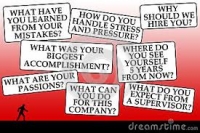Job Interview Questions
Tuesday 09 August, 2016 Written by Monster
All managers have their favourite questions to ask job candidates, from the banal to the bizarre. But what do the answers to these questions actually tell you about your interviewee?
All job interview questions should be designed to find out if the candidate can do the job, how they react under pressure and how well they will fit into the team. They can generally be grouped into three types; standard questions, investigative questions and bad questions.
Standard questions
These are commonplace at job interviews and your candidates will probably have some pre-prepared answers. However, that doesn't mean they shouldn't be asked as they provide and effective way of evaluating candidates against each other. For example:
- What attracted you to this role? – This will tell you how much research they have done into the role and company. You want someone who has a clear idea of what the role encompasses and why they would be good at it.
- What are your main motivations? – Are they looking to develop their skills with your company or do they feel passionate about the industry you operate in?
- What are your main strengths and weaknesses? – It's always good to find out what candidates think they are particularly good at so you can ask them to expand on each area and work out how it would help them succeed in the role. When hearing their weaknesses, ask what steps they have taken to try and overcome them.
Investigative questions
A well as technical questions about the role, you will want to find out a bit more about the type of worker they are and the experience they have gained. These could include:
- What management styles doe you work best under? – Does this match they type of management that they could expect to experience if they got the job?
- What type of people do you like to work with? – Again, this will help you find out if they will fit into your existing team structure.
- What has been the biggest challenge in your career? – Finding out how they turned a situation around can tell you a lot about an individual. It also lets you assess what they perceive to be a ‘challenge'.
- What has been your biggest career success? – It's always good to find candidates who are proud of their work and this gives them a chance to shine.
- If you could take back one career decision, what would it be? – Does the candidate learn from their mistakes? This question can tell you a lot about the journey they have been on in their career. Do they genuinely like their choice of career or do they wish they were doing something else?
You should also look to investigate things like their knowledge of relevant computer software, competency in languages and their grasp of your products, industry and competitors.
Bad questions
A bad interview question can not only take your interview wildly off course, but it may also put you in a negative light in the mind of the interviewee. Here's a few to avoid:
- Tell me about yourself – Firstly, it's not actually a question. Secondly you're not providing a starting point so the response might not tell you what you were hoping to find out. Try an alternative such as “Can you describe why you have chosen this career path?”
- Where do you want to be in five years? – The truthful answer would be on a beach in Hawaii after winning the lottery. The answer you will get will probably be “to have progressed within your company into a management position” or an equally ‘interviewer pleasing' answer. Instead, ask “Which of your skills do you hope to develop over the next few years to help you take a step up in your career?”
- What can you do for us that others can't? – Isn't that your job as the interviewer to figure out? Candidates will be unlikely to know about the strengths and weaknesses of their competitors, so will generally resort to an answer related to their work ethic. “What is your most valuable skill?” will give you much more useful answers.
- If you were an animal, which one would you be? – This used to surprise candidates, but many will now be prepared for this amateur attempt at psychological analysis. If you're looking for a lion (or someone who shows leadership) then ask a more direct question about their leadership skills.
- What is your marital status? – Any question that is of a personal nature (including age, gender, race, religion, sexuality or disability) is not only unethical, but often illegal.
- What salary are you hoping for? – This is something that can be discussed before or after a job interview, but not during as it's not right to put your interviewee under pressure to commit to a figure on the spot.
Source: Monster
Leave a comment
Make sure you enter all the required information, indicated by an asterisk (*). HTML code is not allowed.
Join
FREE
Here










